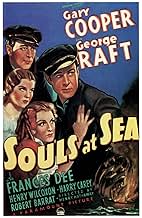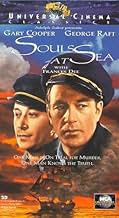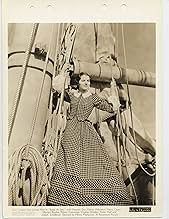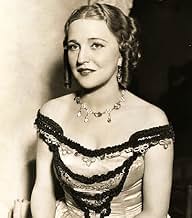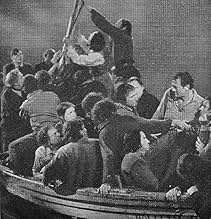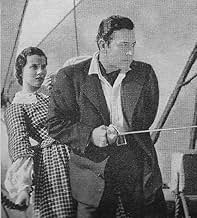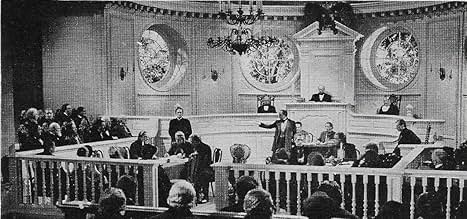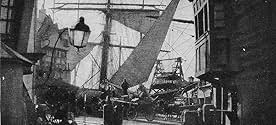अपनी भाषा में प्लॉट जोड़ेंCooper and Raft save lives during a sea tragedy in this story about slave trade on the high seas in 1842.Cooper and Raft save lives during a sea tragedy in this story about slave trade on the high seas in 1842.Cooper and Raft save lives during a sea tragedy in this story about slave trade on the high seas in 1842.
- निर्देशक
- लेखक
- स्टार
- 3 ऑस्कर के लिए नामांकित
- 3 जीत और कुल 3 नामांकन
Norman Ainsley
- Ticket Taker
- (बिना क्रेडिट के)
फ़ीचर्ड समीक्षाएं
Some of the events in "Souls at Sea" were inspired by a shipwreck in about 1840. However, despite appearances, it's clearly a highly fictionalized version of history and really doesn't claim to be a true story.
When the story begins, Nuggin (Gary Cooper) and Powdah* (George Raft) are serving aboard a slave ship. Although slavery was still legal in the States, it was illegal to import slaves...and the British navy enforced a blackade of slavers. If they caught them, the men serving aboard the slave ships were prosecuted...so you'd assume that the two men are evil. But you cannot have a film with slavers being the heroes...even back in 1937. Well, it turns out that Nuggin is actually working on his own as an anti-slaver....and he's had a history of scuttling these ships and setting the poor slaves free. As a result, he is made an undercover operative for the British...and his task involves getting to America as soon as possible to set a trap for other slave ships. But Nuggin's arch nemesis (Henry Wilcoxon) is also bound for the States to stop him...and they're aboard the same ship! What's next? Well, a lot!!
Apart from an interesting plot, the film benefits from good acting and some amazing shipwreck scenes....truly spectacular. Overall, a wonderful adventure film that isn't perfect (Raft seemed mostly wasted and in the way during most of the film), but is nevertheless well worth seeing.
* Who thought of these insane names?! Huh!??!
When the story begins, Nuggin (Gary Cooper) and Powdah* (George Raft) are serving aboard a slave ship. Although slavery was still legal in the States, it was illegal to import slaves...and the British navy enforced a blackade of slavers. If they caught them, the men serving aboard the slave ships were prosecuted...so you'd assume that the two men are evil. But you cannot have a film with slavers being the heroes...even back in 1937. Well, it turns out that Nuggin is actually working on his own as an anti-slaver....and he's had a history of scuttling these ships and setting the poor slaves free. As a result, he is made an undercover operative for the British...and his task involves getting to America as soon as possible to set a trap for other slave ships. But Nuggin's arch nemesis (Henry Wilcoxon) is also bound for the States to stop him...and they're aboard the same ship! What's next? Well, a lot!!
Apart from an interesting plot, the film benefits from good acting and some amazing shipwreck scenes....truly spectacular. Overall, a wonderful adventure film that isn't perfect (Raft seemed mostly wasted and in the way during most of the film), but is nevertheless well worth seeing.
* Who thought of these insane names?! Huh!??!
Although not in the same lofty class as William Wyler, Alfred Hitchcock, Billy Wilder or Fred Zinnemann, Henry Hathaway remains one of my favorite Hollywood directors. I particularly like CALL NORTHSIDE 777, RAWHIDE and NIAGARA, but will quickly add that I found SOULS AT SEA a gem.
For starters, Gary Cooper and Frances Dee were at the height of their physical beauty, in addition to punching in terrific performances - Cooper always with a comic touch, Dee delightful in every nuance of her lovely eyes.
They are ably seconded by George Raft, Cooper's chum and a rather uneducated but senior shiphand who picks up some cultural pointers from Cooper and ends with sensitive, even sentimental moments.
Terrific enmical exchanges between Cooper and Henry Wilcoxon as Dee's devious brother. The two have issues over slavery, which the former actively sabotages and the latter sees as a major income opportunity.
Glorious B&W cinematography from Merrit Gerstad and Charles Lang, with terrific sequences at sea, notably as the little girl inadvertently starts a fire and the bad ship William Brown goes down.
The screenplay by Grover Jones and Dale Van Every includes some highly comic scenes, such as when Cooper, Dee and Wilcoxon all have hiccups at the same time, some very touching ones between Raft and love interest Olympe Bradna, and some very tragic decisions that Cooper has to make as the ship sinks.
Despite narrative ups and downs, the production values are very high, and the film remains engrossing throughout. 7/10.
For starters, Gary Cooper and Frances Dee were at the height of their physical beauty, in addition to punching in terrific performances - Cooper always with a comic touch, Dee delightful in every nuance of her lovely eyes.
They are ably seconded by George Raft, Cooper's chum and a rather uneducated but senior shiphand who picks up some cultural pointers from Cooper and ends with sensitive, even sentimental moments.
Terrific enmical exchanges between Cooper and Henry Wilcoxon as Dee's devious brother. The two have issues over slavery, which the former actively sabotages and the latter sees as a major income opportunity.
Glorious B&W cinematography from Merrit Gerstad and Charles Lang, with terrific sequences at sea, notably as the little girl inadvertently starts a fire and the bad ship William Brown goes down.
The screenplay by Grover Jones and Dale Van Every includes some highly comic scenes, such as when Cooper, Dee and Wilcoxon all have hiccups at the same time, some very touching ones between Raft and love interest Olympe Bradna, and some very tragic decisions that Cooper has to make as the ship sinks.
Despite narrative ups and downs, the production values are very high, and the film remains engrossing throughout. 7/10.
I never really found Gary Cooper to be the most invigorating of actors, but he delivers well here in this tale of maritime treachery. We start at a trial where he ("Nuggin") is being indicted for the killing of survivors from a seaborne disaster in the mid 1800s. It's while the evidence is being given that we are taken back on a retrospective of just how this honourable seaman found himself caught up, with his friend "Powdah" (George Raft) in the evil machinations of "Tarryton" (Henry Wilcoxon). When the boat he was travelling on manages to hit an iceberg, he is left to take charge. As usual there aren't enough spaces on the life boats so panic ensues, and a fairly "survival of the fittest" one at that, the results of which result in his current predicament. How to prove his innocence? Well that might lie in the hands of "Woodley" (George Zucco) who is working for the British Government on a mission to finally eradicate slavery, and who knows a thing or two about the real character of "Nuggin". It's a tautly directed adventure for the first half with plenty of duplicity going on, but when his relationship with "Margaret" (Frances Dee) starts to take a more prominent role in the story, we head into a rather disappointing form of 1930s soapdom. Raft tries his best and in many ways reminded me of Robert Newton but his loyal and decent character is sadly underused whilst the more interesting and perilous anti-slavery storyline becomes a little too subsumed amidst the lace and umbrellas. It's still a film that's well paced for the most part and one that makes you realise that the abolition of slavery in itself didn't actually halt this odious practice in the United States. There were still plenty of officials complicit in this lucrative activity.
It's a given that captains of cruise liners have a sworn duty to protect their passengers in case of any emergency, and their safety is paramount to any other concerns. Unfortunately, it hasn't always been the case. August 1937's "Souls at Sea," starring Gary Cooper, is based on the 1841 sinking of the 'William Brown,' a packet ship that hit an iceberg, sending its passengers scurrying into two lifeboats. Trouble was, one of the lifeboats became extremely overloaded, causing members of the ship's crew to toss some passengers over the side to avoid sinking the packed boat.
"This obscure film is so wonderful because (George) Raft and Cooper are dynamite together," gushed film reviewer Dennis Schwartz. "So who knew both laconic actors could be so animated and such a joy to watch together!"
Henry Hathaway directed this seafaring tragedy as Paramount Picture's version of MGM's 1935 "Mutiny on the Bounty." Cooper's character, Michael Taylor, is first seen in a courtroom listening to his verdict of guilty of murder for shooting at several desperate passengers clinging to the lifeboat. In the movie, the 'William Brown' sinks from a fire started by a young girl accidentally knocking over an oil lamp. Taylor takes charge of the lifeboat that's becoming swamped by too many survivors in the middle of the ocean. He feels he needs to take action or else everyone will drown. After the verdict was read, a British Navy official pointed out that his heroic actions on the lifeboat saved lives. He also added Taylor's work as an undercover abolitionist assisting the English in thwarting the illegal African slave trade to the United States should also be considered and the jurists should suspend his sentence.
"Souls At Sea" highlights details from the 1842 Supreme Court case United States vs. Holmes. After the 'William Brown' sinking where 12 passengers were forced out of the lifeboat by the ship's crew and drowned, only one crewman on the lifeboat, Alexander Holmes, was found in Philadelphia to stand trial. He was indicted for murder, but the jury came back with a less severe manslaughter verdict, sending the case all the way to the Supreme Court. The court ruled the crew's paramount duty was to the save the passengers, and if there were any life-threatening sacrifices to be made, the crew should go first.
"Souls at Sea" contains a flashback involving a series of romantic interests. Navy Lieutenant Stanley (Henry Wilcoxon), captain of the 'William Brown' secretly works for slave traders. Stanley and Taylor eventually come to blows, even though the abolitionist has fallen in love with the captain's sister, Margaret (Frances Dee). George Raft, as Taylor's buddy, Powdah, is also romantically linked to another woman on board, Babsie (Olympe Bradna).
One event related to "Souls at Sea" may have inspired the 1937 movie "A Star Is Born" which involved John Bowers. The former silent movie star, unemployed in Hollywood since 1931, was one of many actors unable to make the transition to sound. He had worked with Henry Hathaway in the past and knew the director was filming scenes for "Souls at Sea" off the shore of Catalina Island. Hoping to get a walk-in role, Bowers rented a small 16-foot sailboat to meet Hathaway, only to receive a firm rejection from him. He was last spotted sailing on his small boat away from the island, never to be seen alive. His body washed up on the Santa Monica beach, presumably from suicide, a fate Norman Maine suffered as he walked into the ocean at the conclusion of "A Star Is Born."
"Souls At Sea" was labeled 'artistically valuable' by the German government, one of the few Hollywood movies that Joseph Goebbels, the minister of propaganda, promoted for the increasingly restrictive country's movie import market. The Nazis' thinking followed the Aryan race philosophy that some groups of people had to be sacrificed for the good and the advancement of the German nation. The Paramount motion picture received three Academy Award nominations, including Best Assistant Director (Hal Walker) (in its last year as a category), Best Art Direction (Hans Dreier and Roland Anderson), and Best Music Scoring (Boris Morros).
"This obscure film is so wonderful because (George) Raft and Cooper are dynamite together," gushed film reviewer Dennis Schwartz. "So who knew both laconic actors could be so animated and such a joy to watch together!"
Henry Hathaway directed this seafaring tragedy as Paramount Picture's version of MGM's 1935 "Mutiny on the Bounty." Cooper's character, Michael Taylor, is first seen in a courtroom listening to his verdict of guilty of murder for shooting at several desperate passengers clinging to the lifeboat. In the movie, the 'William Brown' sinks from a fire started by a young girl accidentally knocking over an oil lamp. Taylor takes charge of the lifeboat that's becoming swamped by too many survivors in the middle of the ocean. He feels he needs to take action or else everyone will drown. After the verdict was read, a British Navy official pointed out that his heroic actions on the lifeboat saved lives. He also added Taylor's work as an undercover abolitionist assisting the English in thwarting the illegal African slave trade to the United States should also be considered and the jurists should suspend his sentence.
"Souls At Sea" highlights details from the 1842 Supreme Court case United States vs. Holmes. After the 'William Brown' sinking where 12 passengers were forced out of the lifeboat by the ship's crew and drowned, only one crewman on the lifeboat, Alexander Holmes, was found in Philadelphia to stand trial. He was indicted for murder, but the jury came back with a less severe manslaughter verdict, sending the case all the way to the Supreme Court. The court ruled the crew's paramount duty was to the save the passengers, and if there were any life-threatening sacrifices to be made, the crew should go first.
"Souls at Sea" contains a flashback involving a series of romantic interests. Navy Lieutenant Stanley (Henry Wilcoxon), captain of the 'William Brown' secretly works for slave traders. Stanley and Taylor eventually come to blows, even though the abolitionist has fallen in love with the captain's sister, Margaret (Frances Dee). George Raft, as Taylor's buddy, Powdah, is also romantically linked to another woman on board, Babsie (Olympe Bradna).
One event related to "Souls at Sea" may have inspired the 1937 movie "A Star Is Born" which involved John Bowers. The former silent movie star, unemployed in Hollywood since 1931, was one of many actors unable to make the transition to sound. He had worked with Henry Hathaway in the past and knew the director was filming scenes for "Souls at Sea" off the shore of Catalina Island. Hoping to get a walk-in role, Bowers rented a small 16-foot sailboat to meet Hathaway, only to receive a firm rejection from him. He was last spotted sailing on his small boat away from the island, never to be seen alive. His body washed up on the Santa Monica beach, presumably from suicide, a fate Norman Maine suffered as he walked into the ocean at the conclusion of "A Star Is Born."
"Souls At Sea" was labeled 'artistically valuable' by the German government, one of the few Hollywood movies that Joseph Goebbels, the minister of propaganda, promoted for the increasingly restrictive country's movie import market. The Nazis' thinking followed the Aryan race philosophy that some groups of people had to be sacrificed for the good and the advancement of the German nation. The Paramount motion picture received three Academy Award nominations, including Best Assistant Director (Hal Walker) (in its last year as a category), Best Art Direction (Hans Dreier and Roland Anderson), and Best Music Scoring (Boris Morros).
Gary Cooper (Nuggin) is on trial for manslaughter at sea. He is accused of playing God and deciding who lives and who dies on a sinking ship in the Atlantic Ocean. The verdict is pronounced and then George Zucco (Woodley) steps forward to give a statement and we head into flashback for the film's story. It is one that is set on the seas and involves slavery versus anti-slavery, romance and is partly a buddy-buddy movie with Cooper and his friend George Raft (Powdah). There is also tragedy and the story is based on an incident that set a precedent in maritime law.
It's an entertaining film with twists as to who is doing what so pay attention. It also has an interesting angle due to the legal significance of the story, and all the cast play their roles well. If you take note at the beginning of the film during the prosecutor's speech in the court case, he mentions some of those who didn't survive the tragedy. We will be introduced to these characters when the film moves onto the doomed ship.
Would you throw people out of a lifeboat to ensure the survival of at least some of them rather than the death of all of them? Every man for himself or do passengers come first? Why not just fly instead?
It's an entertaining film with twists as to who is doing what so pay attention. It also has an interesting angle due to the legal significance of the story, and all the cast play their roles well. If you take note at the beginning of the film during the prosecutor's speech in the court case, he mentions some of those who didn't survive the tragedy. We will be introduced to these characters when the film moves onto the doomed ship.
Would you throw people out of a lifeboat to ensure the survival of at least some of them rather than the death of all of them? Every man for himself or do passengers come first? Why not just fly instead?
क्या आपको पता है
- ट्रिवियाWhen Nuggin and Powdah are in a tavern, the bartender immerses a hot iron into their beer mugs. This was most likely part of making a popular sailor's drink at the time called a "flip". It was made with beer, rum, sugar or molasses (and possibly a spice like cinnamon or cloves). The hot poker caramelizes the sugar. The technique was also just a quick way to warm beer during the winter.
- गूफ़Reading Hamlet aloud, Gary Cooper says, "the thousand natural shocks that the flesh is heir to." The second "the" is a mistake--it spoils the scansion.
- भाव
Michael 'Nuggin' Taylor: The floor of the ocean is paved with the bones of slaves.
- कनेक्शनReferenced in Make Way for Tomorrow (1937)
- साउंडट्रैकSusie Sapple
(1937) (uncredited)
Music by Ralph Rainger
Lyrics by Leo Robin
Performed by George Raft and Gary Cooper
टॉप पसंद
रेटिंग देने के लिए साइन-इन करें और वैयक्तिकृत सुझावों के लिए वॉचलिस्ट करें
- How long is Souls at Sea?Alexa द्वारा संचालित
विवरण
- चलने की अवधि
- 1 घं 32 मि(92 min)
- रंग
- पक्ष अनुपात
- 1.37 : 1
इस पेज में योगदान दें
किसी बदलाव का सुझाव दें या अनुपलब्ध कॉन्टेंट जोड़ें

